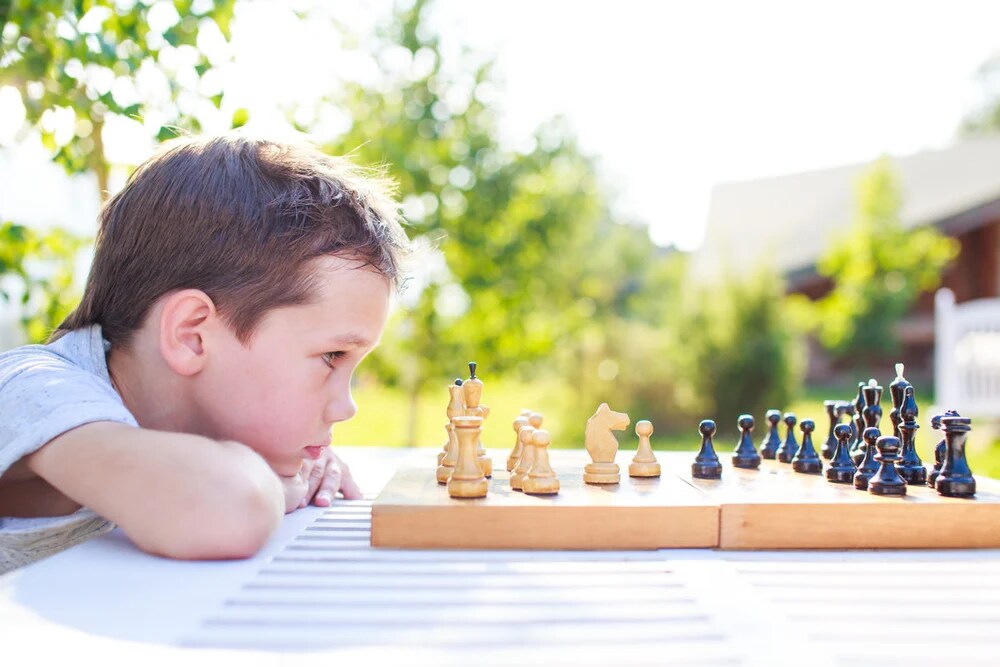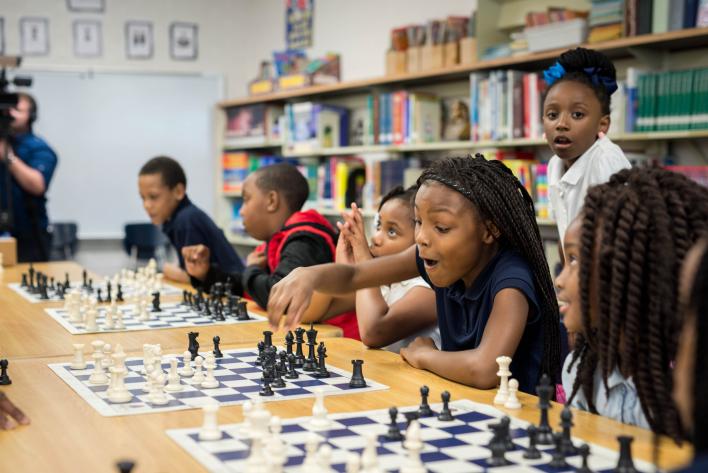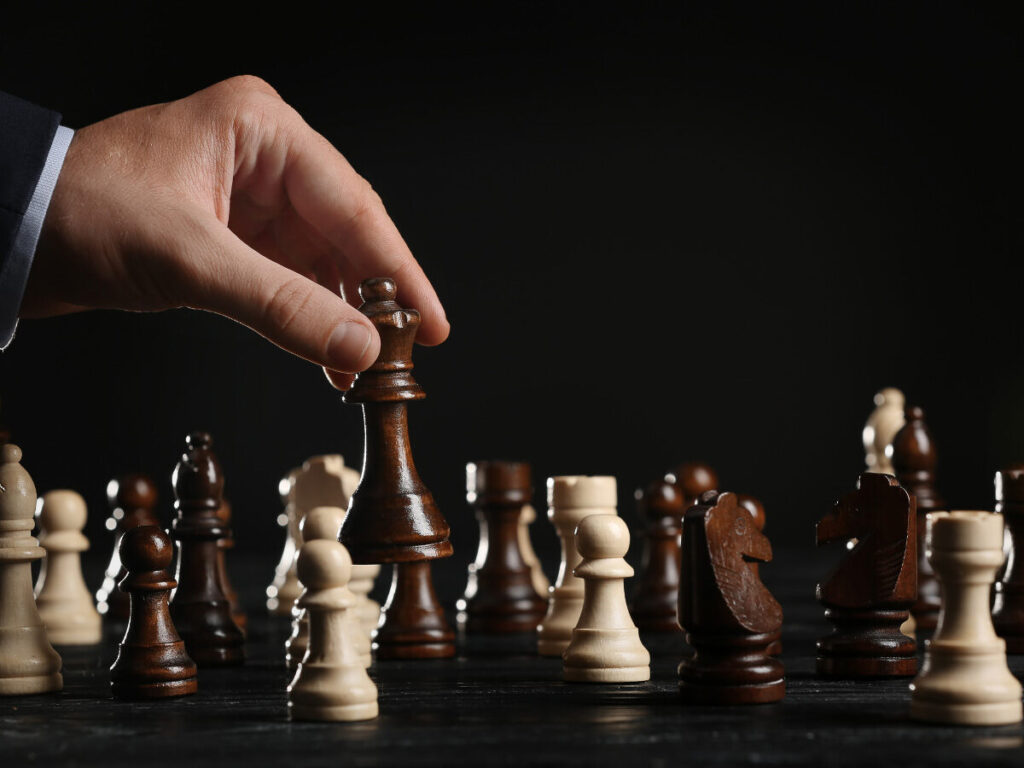Chess has long been celebrated as a game of strategy, intelligence, and focus. For many parents, it’s seen as a pastime that’s good for sharpening the mind. But beyond the moves on the board, there’s a much deeper value to chess, especially when it comes to teaching kids how to solve problems.
In this article, we will explore why chess is such a powerful tool for helping children develop problem-solving skills. We’ll break down how this centuries-old game trains young minds to think critically, stay calm under pressure, and approach challenges with patience and creativity. By the end, you’ll have a clear understanding of how chess can benefit your child and how you can introduce it to them in a meaningful way.
Why Chess is the Ultimate Problem-Solving Tool
When a child plays chess, they are constantly faced with problems. Every move on the board requires careful thought, and each decision can impact the outcome of the game several moves later.
In this sense, chess is much like life—problems appear, and each decision we make has long-term effects.
Chess teaches children that there are different ways to solve a problem. There’s never just one move or one answer. This flexibility is key in life.
Whether it’s solving a puzzle in school or figuring out how to handle a disagreement with friends, chess gives kids the mental tools to find their way forward.
Most importantly, chess teaches children how to break down big problems into smaller, manageable parts. Instead of feeling overwhelmed, they learn to handle each part of the game one move at a time.
This approach is incredibly useful in daily life, helping kids face difficult tasks with confidence.
Learning Patience and Delayed Gratification
One of the most important lessons chess offers is patience.
Unlike fast-paced games, chess is slow and deliberate. Every good player knows that rushing through a game leads to mistakes. Children quickly learn that they can’t jump into attacks or make decisions without thinking them through.
This need for patience helps kids develop the ability to wait for the right moment. In chess, sometimes the best move is no move at all. Kids learn the value of waiting, planning, and setting up for future success. This directly translates to how they approach challenges in life.
In today’s world of instant gratification, the ability to wait and think before acting is rare but incredibly valuable. Chess helps kids understand that taking their time and thinking carefully can lead to much better results.
Whether it’s waiting for the right moment to speak in a conversation or working steadily on a school project, the patience learned through chess is a skill that benefits children for life.
Building Resilience Through Setbacks
Losing is a natural part of chess. No matter how skilled a player is, they will face defeat at some point. Chess teaches children that losing isn’t the end of the world, but an opportunity to learn.
Each loss is a chance to reflect on mistakes, think about what went wrong, and figure out how to improve next time.
This lesson is vital for building resilience. Life is full of setbacks, whether it’s a bad grade, a sports loss, or a personal disappointment. Kids who play chess understand that setbacks are temporary and can be overcome with effort and learning.
This resilience helps them face challenges with a positive attitude, knowing that failure is just a stepping stone to improvement.
Chess encourages a growth mindset—the belief that abilities can be developed through dedication and hard work.
This is the opposite of a fixed mindset, where people believe they are either “good” or “bad” at something and can’t change. By playing chess, children learn that they can always improve, no matter where they start, which gives them the confidence to tackle even the toughest problems.
Enhancing Focus and Concentration
Chess demands complete attention. Each move on the board matters, and one lapse in focus can lead to a big mistake. Kids quickly realize that they need to stay fully engaged throughout the game to succeed. Over time, this helps build their ability to concentrate for longer periods.
In today’s world, where distractions are everywhere, the ability to focus is a rare skill. Children who play chess learn how to tune out distractions and stay locked into the task at hand.
This skill helps them not just in chess, but also in schoolwork, sports, and any activity that requires deep concentration.
Developing Critical Thinking Skills
Critical thinking is at the heart of problem-solving. When kids play chess, they have to evaluate their options, think through consequences, and decide on the best course of action.
They learn to ask themselves important questions, like “What will happen if I move this piece?” or “What might my opponent do next?”
This critical thinking process helps kids approach real-world problems in a more thoughtful way. Instead of jumping to conclusions or making quick decisions, they learn to analyze situations, consider different outcomes, and choose the best solution.
This is a valuable life skill that can help in academics, social situations, and later in the workplace.
Strengthening Memory and Recall
Chess challenges the brain to remember patterns, positions, and past games. Kids need to recall specific moves or strategies they’ve used before and apply them to new situations.
This mental exercise strengthens their memory and helps them retain important information.
Good memory is a valuable asset in school and life.
Children who play chess tend to perform better at tasks that require remembering facts, details, or steps in a process. Whether it’s memorizing math formulas or historical events, chess trains the brain to store and recall information efficiently.
Promoting Creativity and Imagination
Chess may seem like a rigid game with strict rules, but it actually encourages a lot of creativity. Kids are often faced with unique situations where they need to think outside the box and come up with unexpected moves.
Chess teaches them that sometimes, the most creative solution is the best one.

This imaginative problem-solving skill carries over into everyday life. Whether they’re writing a story, tackling a project, or solving a puzzle, children learn that there are always different, creative ways to approach a challenge.
Teaching Accountability for Decisions
In chess, every move a player makes is entirely their own choice. No one else can make the decision for them.
Kids quickly learn that they must take responsibility for their actions on the board, whether the result is a win or a loss.
This lesson in accountability is crucial. It teaches children that their decisions, both in chess and in life, have consequences.
Whether they succeed or fail, they understand that they are in control of their choices. This self-awareness helps them become more responsible and thoughtful individuals.
Encouraging Healthy Competition
Chess is a competitive game, but it fosters a sense of respectful competition. Kids learn how to compete fairly and respect their opponents, regardless of the outcome.
This healthy approach to competition helps children enjoy the challenge, rather than focusing only on winning.
In real life, this skill is important. Whether in school, sports, or later in their career, children will face competition.
Chess teaches them how to handle it gracefully, giving them the confidence to challenge themselves without fear of losing.
Boosting Emotional Control

Chess teaches kids how to manage their emotions. During a game, they may feel excitement, frustration, or disappointment. However, they quickly learn that staying calm and composed is key to making smart decisions.
Emotional control becomes essential, especially when the game is intense.
This ability to manage emotions is important in everyday life. Whether they face stress in school, disagreements with friends, or other challenges, children who play chess are better equipped to handle their feelings and think clearly under pressure.
Building Perseverance and Grit
Success in chess doesn’t happen overnight. It requires practice, learning from mistakes, and persistence. When children play chess, they learn to keep trying even after a tough loss.
They understand that improvement comes from consistent effort and reflection.
This perseverance helps kids tackle difficult tasks in school and life. Whether they are learning a new subject or facing personal challenges, the grit they develop from chess ensures that they don’t give up easily. They see obstacles as opportunities to grow.
Preparing Kids for Future Challenges
Chess equips children with skills that are directly transferable to real-world situations.
The problem-solving, focus, patience, and resilience they develop through chess prepare them for the academic and social challenges they will face as they grow older.
By teaching kids how to handle complex problems strategically, chess gives them a toolkit for success in many areas of life, helping them become thoughtful, capable problem-solvers who can approach any challenge with confidence.
Improving Decision-Making Skills

In chess, every move is a decision that can affect the outcome of the game. Kids must think about the pros and cons of each choice and quickly weigh their options.
Over time, they get better at making thoughtful, informed decisions.
This decision-making process mirrors real-life situations. Children learn to consider different factors before making choices, whether it’s choosing how to spend their time, which friends to trust, or how to approach a difficult homework assignment.
Chess teaches them that every decision counts and that careful thought leads to better results.
Learning to Adapt to New Situations
A chess game rarely goes according to plan. No matter how well a child prepares, their opponent might make an unexpected move, forcing them to adapt.
This teaches children to stay flexible and adjust their strategy as the situation changes.
This ability to adapt is crucial in life. Kids who play chess learn that things won’t always go as planned, and they become more comfortable adjusting to new or unexpected challenges.
Whether it’s a change in school plans or dealing with an unexpected problem, they are better prepared to think on their feet and find solutions.
Developing Time Management Skills
Chess often involves managing time, especially when playing with a clock. Players must make smart moves while keeping an eye on the time, balancing both speed and thoughtfulness.
This teaches children how to manage their time effectively, a skill that’s essential in many aspects of life.
In school, this translates to better time management for assignments, projects, and tests.
Children who play chess understand the importance of pacing themselves, knowing when to spend extra time thinking and when to make quick decisions. This helps them manage their workload more efficiently as they grow.
Strengthening Analytical Thinking

Chess forces players to analyze the board constantly. Children must evaluate different positions, understand threats, and recognize opportunities.
This constant analysis improves their ability to assess situations logically and carefully.
Analytical thinking helps kids break down problems and look at them from different angles.
Whether it’s solving math problems, understanding science experiments, or analyzing literature, this skill is incredibly valuable. Chess teaches children to think critically about every move they make, both in the game and in life.
Encouraging Goal Setting
In chess, each game begins with a goal—whether it’s winning, improving on a past performance, or mastering a specific opening strategy. Kids learn to set short-term goals (like capturing a key piece) and long-term goals (such as checkmating their opponent).
These goals help them stay focused throughout the game.
This habit of setting and working toward goals is highly beneficial for children.
Whether they are striving for better grades, aiming to improve in a sport, or working on personal development, chess teaches them how to set clear objectives and work steadily toward achieving them.
Instilling the Importance of Practice and Preparation
No one becomes a great chess player overnight. Kids quickly understand that consistent practice is the only way to improve.
Learning new strategies, reviewing past games, and studying different techniques are all part of getting better at chess.
This focus on preparation and practice translates directly to other areas of life. Children who play chess realize that success in school, sports, or any other field comes from dedication and hard work.
They are more likely to embrace the idea of practicing to get better, knowing that improvement is a gradual but rewarding process.
Chess Builds Lifelong Problem-Solving Skills
Chess equips children with problem-solving skills that extend far beyond the chessboard. They learn to approach challenges with patience, critical thinking, and creativity.
These skills last a lifetime, helping kids navigate both academic and personal challenges with confidence.
A Game That Teaches Independence
Chess empowers children to take ownership of their decisions. Every move is their own, teaching them to think for themselves and be accountable for their actions.
This independence encourages self-reliance, an essential trait as they grow and face life’s decisions.

Fostering a Growth Mindset
Through chess, kids understand that mistakes are part of the learning process. Each game, whether won or lost, is an opportunity for growth.
This mindset encourages resilience and perseverance, helping children believe that effort leads to improvement in all areas of life.
Enhancing Social and Emotional Skills
Chess is not just about mental strategy—it also promotes social interaction and emotional intelligence. Children learn to respect their opponents, win gracefully, and handle losses with maturity.
These lessons shape their emotional development and help them manage relationships more effectively.
Preparing for Academic and Life Success
The focus, discipline, and problem-solving abilities that chess teaches are directly transferable to academics and everyday challenges.
Children become better equipped to handle complex tasks, stay organized, and think ahead. These foundational skills set them up for success in school and beyond.
A Gift That Keeps Giving
Introducing your child to chess offers them more than a fun game—it’s an investment in their intellectual and emotional growth. The lessons learned through chess provide long-term benefits, shaping them into strategic, thoughtful individuals who are well-prepared for the future.
Wrapping it up
Chess is a powerful tool for developing problem-solving skills in children. It teaches them patience, critical thinking, resilience, and the ability to handle complex challenges both on and off the board. By learning chess, kids gain lifelong skills that prepare them for academic success, personal growth, and future challenges. Introducing your child to chess is not just about playing a game—it’s about giving them the mental tools to succeed in life.
If you’re ready to start your child’s chess journey, visit Global School of Chess and explore how we can guide them every step of the way!
READ NEXT:

